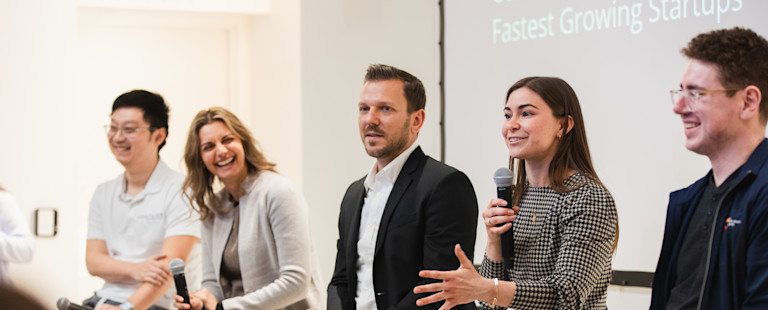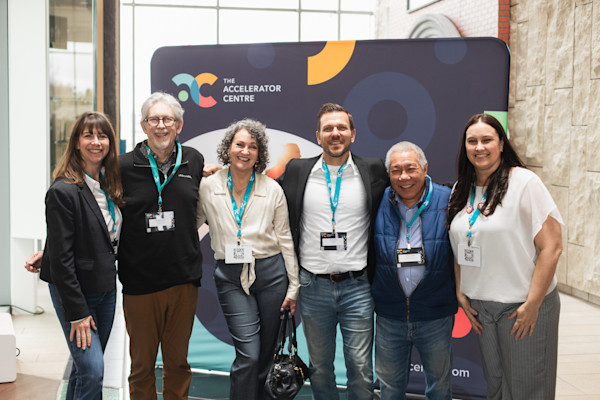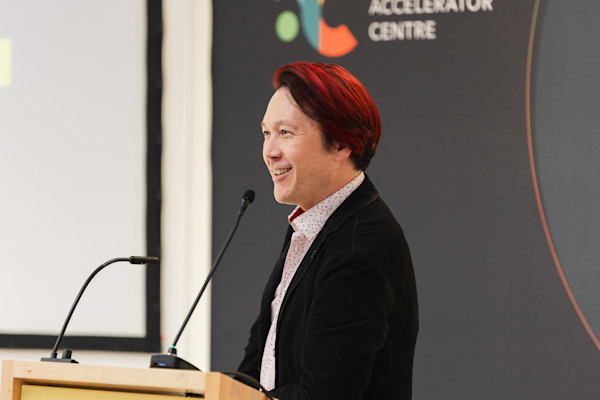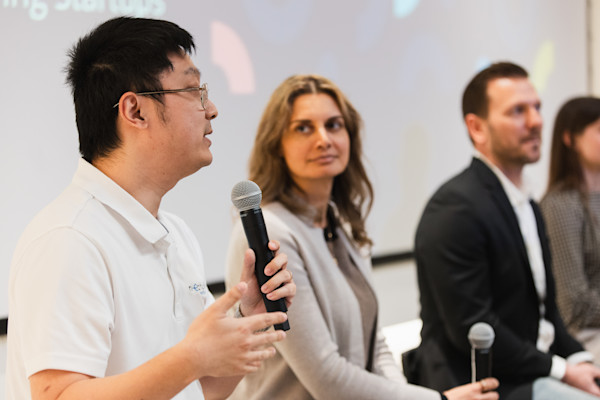AC:Studio Innovation Showcase
On March 26, 2025, over 200 people joined us for the 2025 AC:Studio Innovation Showcase at the Ken Seiling Waterloo Region Museum. It was an afternoon of insights and lessons from founders who have taken the entrepreneurial leap. The day included a showcase with 20 of our AC:Studio startups, a keynote talk from Uvaro founder Joseph Fung, and a panel discussion with four of our AC:Studio founders.

It was an event three years in the making. On Mar. 26, 2025, the Accelerator Centre celebrated the 25 startups graduating from the inaugural AC:Studio program. The first-of-its-kind program provides high-impact, high-potential startups with up to $100,000 in seed funding grants from FedDev Ontario, one-to-one mentorship with our team of in-house and specialist mentors, and support from specialists at SnapPea, Uvaro, Conestoga College's Gig Lab, and other partners.
The program began in May 2022 with the announcement of the 100 startups selected for phase one of the program. The following year, the top 50 startups were announced for phase two, followed by the top 25 being announced in May 2024.
Celebrating founder success
In addition to celebrating the 25 companies completing the AC:Studio program, the 2025 AC Studio Innovation Showcase was also a chance to celebrate the first anniversary of Ruth Casselman's leadership as CEO. In her opening remarks, Casselman told the packed audience at the Ken Seiling Waterloo Region Museum that the AC:Studio is not a traditional startup support program.

“It is a launch pad where bold ideas get the hand on support and help needed to build impactful businesses,” Casselman said. “We started AC:Studio because we saw a big gap. We've worked with hundreds of founders over the last 20 years and have seen incredibly talented people with amazing ideas stall before they even get started. It’s not because they lacked hustle—it’s because the barrier to entry was too high.”
Founders face numerous challenges, including finding the right talent, securing capital, building a prototype, and developing a go-to-market strategy.
“Every founder in the room knows that the journey can feel overwhelming. We wanted to change how founders start their businesses. So we asked, what if we could build a program that made starting a company more accessible, more inclusive and more achievable, no matter who you are?” Cassleman said.
Over the last three years, the program's first cohort has supported the startups as they refined and launched game-changing products and services. The founders of these startups are as diverse as the problems they’re solving. 26% are new Canadians, 5% are Indigenous, and 63% are women. AC:Studio startups have created 597 new jobs, launched 104 new products, and raised $62 million in investment.
“These aren't just numbers,” Casselman said. “They are real, tangible impacts on the Canadian economy. These accomplishments are proof that investing in early-stage founders pays off both to the economy and to society.”
Dog Child founder and CEO Nicole Marchand shared a similar sentiment about AC:Studio. She said the startup’s time in the program has been instrumental in its growth and success.
“To be completely honest, Dog Child may not be here today without the mentorship and support we received. The expertise, insights, and advice helped us navigate critical challenges, refine our marketing strategy, and ultimately accelerate our growth,” Marchand said.
Jean-Pierre Eskander, founder and CEO of Sifio Health, said his startup was a “slide deck and a dream” when they were accepted into the first cohort of AC:Studio in 2022.
“Today, in 2025, we've deployed artificial intelligence tools that cut healthcare staffing costs by 30% while improving care access. The program's blend of mentorship, funding, and industry access accelerated our growth tenfold. For any founder serious about scaling AC:Studio is the gold standard,” Eskander said.
Being a founder is not a solo sport
The Innovation Showcase keynote was presented by Joseph Fung, founder and CEO of Uvaro. Fung is a serial entrepreneur known in the community for sharing his time, insights, and shoulder with fellow founders.

Fung’s keynote highlighted the power of community, mentorship, and resilience for entrepreneurs. Reflecting on his entrepreneurial journey, Fung shared candid stories of setbacks with the common thread that "founding a company is not a solo sport."
He described the origin of his first startup, TribeHR, from a casual brainstorming session at the Accelerator Centre. He eventually sold the business to NetSuite, which led to tech giant Oracle opening an office in Kitchener.
“Like a lot of founders, we believed our idea was better than everyone else's. We really didn't have a plan,” Fung said. “We had hope, drive, passion, and an absolute conviction that we could build something incredible together.”
Fung stressed the importance of maintaining integrity and valuing relationships over spreadsheets, recalling how he covered losses for early investors after realizing a mistake with his cap table. He had made a mistake in a calculation, and the potential return on investment would not match what he told his investors.
“The day we were signing off, I was faced with a choice of going back and trying to fix the paperwork, get them to take this new deal, or commit to them I would make it right,” Fung said. “I'm very grateful they accepted that third option with me. When we eventually sold, I cut them a cheque out of my proceeds for the difference. The idea of following through on that commitment is what's really important because that gives you the permission to succeed, and it gives you the permission to fail.”
He reinforced that founders bear significant responsibilities—not just to their employees and investors but also to their broader community. Highlighting his commitment, Fung noted the establishment of an endowment fund through the Waterloo Region Community Foundation, which continues to make an impact even during difficult times.
Encouraging the next generation of entrepreneurs, Fung urged them to "think about how you're impacting the others around you" and to "show up, nominate entrepreneurs, post that job, share that with your network, offer that advice."
His message underscored that entrepreneurship is about building something lasting and meaningful beyond individual success, calling on everyone to actively participate because "we're not just building companies—we're showing the way you can build companies in Canada."
Insights from four founders
Following Fung’s keynote, Adam Dougall, Program Manager at the Accelerator Centre, took the stage to lead “Finding Investment Success”, a panel discussion with four AC:Studio founders sharing what they have learned in their entrepreneurial journeys.
The founders began by sharing the "Aha" moment that sparked their journey. Aaron Guan, Founder and CEO of Neptune Nanotechnologies Inc., was studying for his PhD when inspiration struck. Neptune Nanotechnologies has developed technology that converts organic ocean waste into nano-structured material for consumer goods packaging.

"We knew that it was a good idea, but when you actually follow through, you realize that you are far less prepared than you should be, and it’s far more challenging,” Guan said, “It was a big decision for me to drop out of that PhD program to commit to this full time."
Sydney Robinson, CEO and co-founder of Vessl Prosthetics, came up with the idea for Isoform, an innovative, easy-to-use prosthetic volume management system for amputees, during her time at the Western Medical Innovation Fellowship at Western University. The program involved speaking with medical professionals across multiple specialties. It was in those interviews that Robinson and her co-founder Oleksiy Zaika locked in on the daily pain and suffering of amputees with leg prosthetics.
"We heard quotes like, 'I would rather suffer than wear socks.' Clearly, there is a problem here that deserves solving,” Robinson said.
For Mila Banerjee, CEO and founder of Pronti AI, the pivotal moment came from an overwhelming customer response. Her startup uses AI to help users create stylish outfits from clothing they already have in their closets. When its early prototype unexpectedly went viral, Banerjee knew her team had something special on their hands.
“I lovingly call this a sweaty armpit moment,” Banerjee said. “We had over 100,000 people come on a weekend to try an MVP that wasn't ready.”
Paul Masojc, co-founder and COO of enVgo, described testing the prototype of their electric hydrofoil boat as the moment the team knew what they were building would work. enVgo is developing marine technology designed to enhance efficiency and sustainability in boating.
“The first time we tested it proved that we could do this, that our math works,” Masojc said. “The experience was incredible, and you really can't experience it unless you actually do it.”
The conversation then moved toward challenges each founder encountered when fundraising. Guan emphasized the importance of clear and concise communication to investors, particularly given the complexity of deep technology. Robinson agreed and added that emotional storytelling is key to capturing investor interest.
"The emotional piece really draws a lot of people in,” Robinson said. “Once you've got people hook, line, and sinker on the emotional piece of the story, that opens the door then for the rest of the technical conversation."
The panelists also addressed common myths around early-stage fundraising. Guan encouraged founders to approach investors early for advice, while Banerjee stressed the importance of building a strong business foundation before reaching out to investors.
“Build your business first because your business is what's going to ultimately drive the investment,” Banerjee said.
Closing the discussion, the panelists reflected openly on the lessons they’ve learned on their entrepreneurial journeys. Guan said his advice after a failure is to figure out what you don’t know early and find the support you need.
"Having that clarity gives you the direction and the courage to find sources of support, and that's how you become a well-rounded founder,” Guan said.
Banerjee shared her experience of learning to challenge assumptions quickly, particularly about who would ultimately pay for Pronti AI’s product.
"In my mind, the business model was always around charging the retailers," Banerjee said. "But what's happened lately is that by charging my users, they're actually even more appreciative and more engaged, and it’s opened up a whole new world."
Masojc rounded out the insights with straightforward advice about building a team and recognizing one's limitations.
"You can't do it all yourself," Masojc said. "Continuously get 1% better every day, keep iterating, keep improving, and before you know it, you're polished and doing really well."
Opening the doors to the next generation of AC:Studio
The next chapter of AC:Studio will launch this year with a new cohort of up-and-coming startup founders. While much of the program will remain the same, there is a new focus on startups building solutions addressing the United Nations Sustainable Development Goals.
“We will be supporting founders who are building solutions that align with these goals, from clean energy and quality education to climate action and inclusive economic growth. We don't know who these founders are yet, and we're very excited to meet them,” Casselman said.
Before attendees joined the founders in the showcase area, Casselman encouraged anyone interested or who knows a founder working towards one of the UN Sustainable Development Goals to apply.
“We've always believed that entrepreneurship is one of the most powerful tools we have to create change,” Casselman said. “With AC:Studio, we're not only helping people to build companies, we're helping them to build solutions to real problems. We're accelerating the kind of innovation that lifts communities, shifts industries, and creates meaningful and lasting impact.”
AC:Studio is funded by the Government of Canada through the Federal Economic Development Agency for Southern Ontario (FedDev Ontario) and is delivered in partnership with WEtech Alliance, Innovate Niagara, Conestoga College, SnapPea, and Uvaro. Cowan Insurance, RBCx, and RSM sponsored the AC: Studio Innovation Showcase.